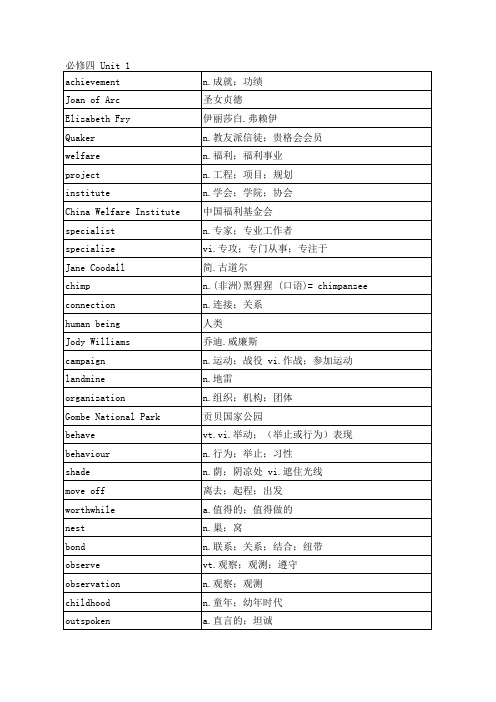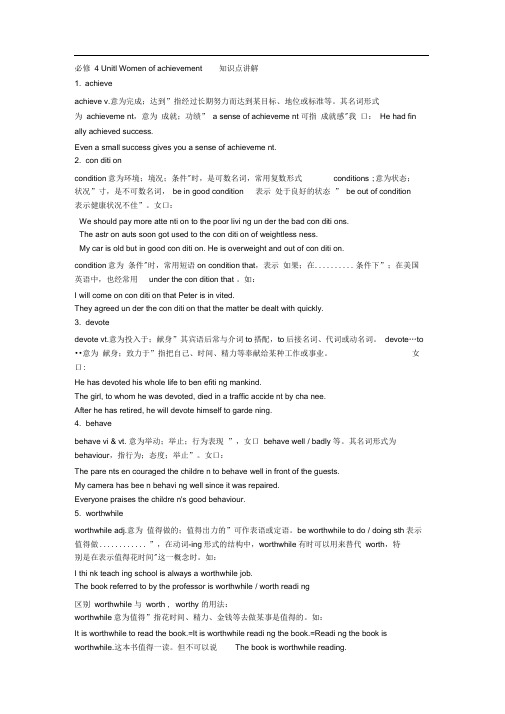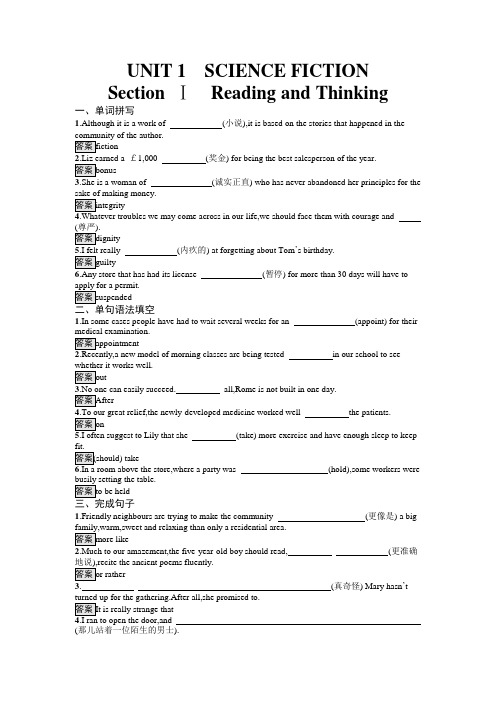高中英语必修四UNIT1
人教版高中英语单词表必修四unit 1

必修四 Unit 1 achievement Joan of Arc Elizabeth Fry Quaker welfare project institute China Welfare Institute specialist specialize Jane Coodall chimp connection human being Jody Williams campaign landmine organization Gombe National Park behave behaviour shade move off worthwhile nest bond observe observation childhood outspoken n.成就;功绩 圣女贞德 伊丽莎白.弗赖伊 n.教友派信徒;贵格会会员 n.福利;福利事业 n.工程;项目;规划 n.学会;学院;协会 中国福利基金会 n.专家;专业工作者 vi.专攻;专门从事;专注于 简.古道尔 n.(非洲)黑猩猩 (口语)= chimpanzee n.连接;关系 人类 乔迪.威廉斯 n.运动;战役 vi.作战;参加运动 n.地雷 n.组织;机构;团体 贡贝国家公园 vt.vi.举动;(举止或行为)表现 n.行为;举止;习性 n.荫;阴凉处 vi.遮住光线 离去;起程;出发 a.值得的;值得做的 n.巢;窝 n.联系;关系;结合;纽带 vt.观察;观测;遵守 n.观察;观测 n.童年;幼年时代 a.直言的;坦诚
respect argue argument entertainment lead a...life crowd crowd in inspire inspiration support look down upon/on e across career rate sickness intend emergency generation determination kindness considerate consideration deliver carry on modest
人教版高中英语必修四unit1-单词(共23张PPT)

r_e__s_p_e__c_t_fu_sltudent.
2 The two friends said goodbye and went their
r_e_s_p__e_c_t_i_v_e_ ways.
__________ __________ __________ we are very fortunate.在这方面我们是很幸运的。
12. look down upon/on 蔑视,瞧不起
(3)give one’s respects to sb. 向某人致意
in some respects 在某些方面 in every respect/in all respects 在各方面
即学即练 respectable respectful respective
1 Our Chinese teacher was so r_e_s_p__e_c_t_a_b__le that I
crowd in/into sp.涌入/挤进某场所
拓展 (1)_c_ro_w__d_e_d_ adj.
(2)球赛结束后,人群为胜利而欢呼。 After the football match,__t_h_e_c_r_o_w__d cheered the winning. (3)一大群人在那里围观。
_A__c_r_o_w_d__o_f_p_e_o_p_l_e____ were looking on. (4)房间挤满了客人。 The housei_s_c_r_o_w_d_e_d__w_i_th__g_u_e_s_t_s_. (5)他从来不随大流。
The meeting is________ ________ ________the plan for building a new swimming pool.
高中英语必修四Unit1的重要知识点及练习资料

必修 4 Unitl Women of achievement 知识点讲解1. achieveachieve v.意为完成;达到”指经过长期努力而达到某目标、地位或标准等。
其名词形式为achieveme nt,意为成就;功绩” a sense of achieveme nt 可指成就感"我口:He had fin ally achieved success.Even a small success gives you a sense of achieveme nt.2. con diti oncondition意为环境;境况;条件"时,是可数名词,常用复数形式conditions ;意为状态;状况”寸,是不可数名词,be in good condition 表示处于良好的状态” be out of condition表示健康状况不佳”。
女口:We should pay more atte nti on to the poor livi ng un der the bad con diti ons.The astr on auts soon got used to the con diti on of weightless ness.My car is old but in good con diti on. He is overweight and out of con diti on.condition意为条件"时,常用短语on condition that,表示如果;在.......... 条件下”;在美国英语中,也经常用under the con dition that 。
如:I will come on con diti on that Peter is in vited.They agreed un der the con diti on that the matter be dealt with quickly.3. devotedevote vt.意为投入于;献身”其宾语后常与介词to搭配,to后接名词、代词或动名词。
人教版高中英语选择性必修第四册UNIT1 Section Ⅰ 含答案

UNIT 1SCIENCE FICTIONSectionⅠReading and Thinking一、单词拼写1.Although it is a work of (小说),it is based on the stories that happened in the£1,000 (奖金) for being the best salesperson of the year.(诚实正直) who has never abandoned her principles for the(内疚的) at forgetting about Tom’s birthday.(暂停) for more than 30 days will have to1.In some cases people have had to wait several weeks for an (appoint) for theirin our school to see.No one can easily succeed.all,Rome is not built in one day.the patients.(take) more exercise and have enough sleep to keep(hold),some workers were1.Friendly neighbours are trying to make the community (更像是) a big.Much to our amazement,the five-year-old boy should read,(更准确.(真奇怪) Mary hasn’t(那儿站着一位陌生的男士).Shopping centres,stadiums and universities may soon have a new tool to help fight crime.A California company says its robots can predict and prevent crime.It says the goal is to reduce crime by half in areas the robots guard.The chief executive officer of the company says,“These robot security guards will change the world.Our planet has more than seven billion people on it.It’s going to quickly get to nine billion people.The security equipment that we have globally is just not going to develop that fast.The company’s Autonomous Data Machines can become the eyes and ears of law enforcement(执法).”“You want them to be machines plus humans.Let the machines do the heavy and sometimes dangerous work and let the humans do the strategic decision-making work,so it’s always working all together.”The machines do not carry weapons but they have day and night video cameras which are able to turn 360 degrees and can also sense chemical and biological weapons.Some people may become concerned about their privacy,especially in connection with the video recordings.Some people may worry that such recordings will appear on the Internet.A law professor says the machines have to be used in the right way and it will be interesting to see how state laws deal with this kind of video.The officer says there is a long waiting list for the robots in the US.Workers in the company are working overtime to meet the demands of the market.At least 25 other countries are also interested in these robot security guards.1.What can this new tool do for humans?A.Make strategic decisions.B.Keep watching day and night.C.Carry heavy weapons.,这种机器人能够日夜不停地执勤站岗。
高中英语选择性必修四unit1作文

高中英语选择性必修四unit1作文Unit 1 of Selective Compulsory English 4 in high school focuses on the topic of Environment. In this unit, students will learn about various environmental issues and how to protect the environment. They will also explore different perspectives on environmental problems and discuss potential solutions.One of the key themes in this unit is the impact of human activities on the environment. Students will learn about the causes and effects of pollution, deforestation, climate change, and other environmental issues. They will also study the importance of environmental conservation and sustainable development.Another important topic in this unit is environmental activism. Students will explore the role of environmental activists in raising awareness about environmental issues and advocating for change. They will learn about different strategies for environmental activism, such as protests, petitions, and social media campaigns.In addition to learning about environmental issues and activism, students in this unit will also have the opportunity to develop and practice their English language skills. They willengage in reading, writing, listening, and speaking activities related to the theme of environment. They will also participate in group discussions, debates, and presentations to further enhance their communication skills.Overall, Unit 1 of Selective Compulsory English 4 is a valuable and engaging learning experience for high school students. By studying and discussing environmental issues, students can develop a deeper understanding of the world around them and become more informed and active global citizens.。
高一英语必修四unit1知识点

习题练习:
When we visited my family home,memory
came___A___back.
A.flooding B.to flood C.flood D.flooded
The lawyer listened with full attention,_B__
to miss. A.not trying B.trying not C.to try to D.not to try
习题练习:
If you have a job,_A___yourself to it and
finally you'll succeed. A.do devote B.don't devote C.devoting D.not devoting
(do 用来加强语气,强调动词)
encourage
project
计划,项目,工程;课题,作业 a project for sth./to do sth.做某事的计划 a project on关于...的课题
eg:工程项目的第一阶段现已完成。 (提示:the first phase)
The first phase of the engineering project has been completed.
A.Being encouraged B.Encouraging
C.Encouraged
D.Having encouraged
Reading Part 1
bahave oneself crowd in
in the shade of work out
move off
say to oneself
比较
common 强调许多事物或人所不同具备的 特点 ordinary 与一般事物的性质或标准相同,强调平
Unit 1 重点单词讲解课件 高中英语选择性必修第四册
3.ambition n.追求的目标;夙愿;野心;雄心;志向;抱负 ambitious /æmˈbɪʃəs/ adj.雄心勃勃的;有野心的;有雄心 的;费力的;耗资的;耗时的
I had the ambition, but not the resources. 我有自己追求的目标,但缺乏资源。 It had been her lifelong ambition.这是她终身追求的目 标。
20.numerous /ˈnjuːmərəs/ adj.很多的;众多的;许多的 There are numerous products designed to keep your child safe. 有很多的产品设计,让您的孩子安全。 His views have been expressed in numerous speeches. 他已在无数次发言中表达了自己的观点。 He has been late on numerous occasions. 他已经迟到过无数次了。
22.thoughtful adj.周到的;体贴的;深思熟虑的;深思的;沉思的;思 考的;关心别人的;关切的;缜密思考过的 He had a thoughtful look on his face. 他脸上露出深思的表情。 He is a quietly spoken, thoughtful man. 他是个说话嗓音低、爱思考的人。
8.ultimately /ˈʌltɪmətli/ adv.最终;最后;终归;最基本地;根 本上 ultimate/ˈʌltɪmət/ adj.最后的;最终的;终极的 Ultimately, you'll have to make the decision yourself. 最终你还是得自己拿主意。 A poor diet will ultimately lead to illness. 糟糕的饮食终将导致疾病。
人教版高中英语必修四Unit1【精选】
第一部分 必修四
Unit 1 Women of achievement
考纲知识预览
熟记单词
1.achieve(v.) 完成,达到 2.condition (n.) 条件,状况 3. connection (n.) 连接,关系 4. organization (n.) 组织;机构 5. behave (vi.& vt.) 举止,举动 6. worthwhile (adj.) 值得做的
考纲知识预览
7.为(某人)准备 be intended for 8.接生 deliver a baby 9.献身于 devote...to 10.提到,参考 refer to 11.继续进行 carry on 12.仅次于 second to 13.死亡率 the death rate
考纲知识预览
名师一线讲坛
2. worthwhile adj. 值得的,值得出力的
词条 worthwhile
Байду номын сангаасworth
搭配 It’s worthwhile doing... It’s worthwhile to do...
be worth+n.
be worth doing
意义和用法
值得做某事
值得……,值…… “某事值得被做”要 用动名词的主动形式 表示被动意义。另外
考纲知识预览
7.observe (vt.) 观察;注意到,观测 8. respect (v.) 尊重,尊敬 9. argue (v.) 争论;辩论 10. entertainment (n.) 娱乐,款待 11. inspire (v.) 鼓舞;激发 12.support (v.) 支持;拥护 13. communication (n.) 通讯;交流
人教版高中英语必修4 第一单元unit1单词讲解
重点单词.词组讲解1. achievement n.1. 达成;完成[U]2. 成就,成绩[C]sense of achievement 成就感people of achievement 有成就的人achieve vt. 完成,实现;达到You will never achieve anything if you spend your time that way.The actor achieved fame when he was only nineteen. 那位演员十九岁时就成名了。
achieve one’s dream 实现梦想achieve success 实现成功achieve the goal 实现目标achieve ,realize, come true的区别achieve:实现成绩、目标,主语是人。
realize:实现,意识到,多指意识到某种道理、规律什么的,主语是人。
come true:实现,多指梦想、蓝图、计划,主语是梦想蓝图计划什么的。
【期末测试】Lucy has ________ all of the goals she set for herself in high school and is ready for new challenges at university.A. acquiredB. finishedC. concludedD. achieved【2015北京】But daydreamers are also responsible for some of the greatest ideas and achievements in human history.【2012天津】Teachers’knowledge is the key to students’achievements.2. campaignn. [C]1. 战役The campaign to seize the city was a failure. 攻占这个城市的战役失败了。
高中英语必修四unit1重点单词
高中英语必修四unit1重点单词1. attribute (n/v): The noun form refers to a characteristic or quality of a person or thing. For example, "intelligence" is an attribute of a smart student. As a verb, attribute means to assign or credit something to aspecific cause or source. For instance, "The success of the company can be attributed to its dedicated employees."2. particular (adj): This word refers to something specific or distinct from other things. For example, "I have a particular interest in art history." It can also mean someone who is excessively concerned about details or manners, as in "She pays particular attention to the way she dresses."3. symbolize (v): Symbolize means to represent or stand for something else, often using symbols or signs. For example, "The dove is a universal symbol for peace."4. perspective (n): Perspective refers to a particular point of view or way of thinking. For example, "Both sides of the argument need to be considered from different perspectives."5. declare (v): Declare means to state or announce something openly or officially. For instance, "He declared his love for her in front of everyone." It can also mean to officially register goods or money at customs when entering a country, as in "You must declare any amount over $10,000 when entering the country."6. reveal (v): Reveal means to make known or disclose information that was previously unknown or secret. For example, "The detective revealed the murderer's identity."7. arise (v): Arise means to come into existence or occur. For instance, "A problem arose during the meeting and had to be addressed immediately."8. transition (n): Transition refers to a process or period of change from one state or condition to another. For example, "Moving from high school to college can be a challenging transition for many students."9. collide (v): Collide means to crash or come into violent contact with something. For instance, "The two cars collided at the intersection."10. establish (v): Establish means to set up or create something, often with a firm or stable foundation. For example, "They established a new company in the field of technology."11. adopt (v): Adopt means to take on or assume a position, policy, or way of life. For instance, "The government decided to adopt new measures to reduce pollution." It can also mean to legally take someone else's child as one's own, as in "They adopted a baby from an orphanage."12. profound (adj): Profound refers to something deep, significant, or thoughtful. For example, "The speaker made a profound impact on the audience with his thought-provoking ideas."13. heritage (n): Heritage refers to the practices, beliefs, traditions, or customs that are passed down from previous generations. For instance, "Hetakes great pride in his Irish heritage."14. embrace (v): Embrace means to accept or support something willingly or eagerly. For example, "She embraced the opportunity to study abroad."15. abandon (v): Abandon means to leave behind or give up completely. For instance, "He abandoned his dream of becoming an actor and pursued a career in business."16. confront (v): Confront means to face or deal with a challenging situation or person directly. For example, "She confronted her fears and overcame them."17. advocate (n/v): Advocate refers to someone who publicly supports or recommends a particular cause or policy. For instance, "He is a strong advocate for animal rights." As a verb, advocate means to publicly support or recommend a particular cause or policy. For example, "The organization advocates for equal rights for all."18. distinct (adj): Distinct means different or separate from something else. For instance, "His voice is so distinct that you can recognize it immediately."19. interpret (v): Interpret means to explain or understand the meaning of something. For example, "Different people may interpret a work of art in various ways."20. crucial (adj): Crucial means extremely important or essential. For instance, "Time management is crucial for success in exams."21. evolve (v): Evolve means to develop or change gradually over time. For example, "Human culture has evolved over millions of years."22. manipulate (v): Manipulate means to control or handle something skillfully or cleverly, often with a hidden agenda. For instance, "He manipulated the evidence to make himself look innocent."23. accommodate (v): Accommodate means to provide space or make room for someone or something. For example, "The hotel accommodated all the guests for the conference."24. manipulate (v): Manipulate means to control or handle something skillfully or cleverly, often with a hidden agenda. For instance, "He manipulated the evidence to make himself look innocent."25.precede (v): Precede means to come before something else in time or order. For example, "The dinner preceded the awards ceremony."26.precede (v): Precede means to come before something else in time or order. For example, "The dinner preceded the awards ceremony."27.hinder (v): Hinder means to prevent or make it difficult for someone to do something. For instance, "The heavy rain hindered their plans to go hiking."28.hinder (v): Hinder means to prevent or make it difficult for someone to do something. For instance, "The heavy rain hindered their plans to go hiking."29. susceptible (adj): Susceptible means easily influenced or affected by something. For example, "She is susceptible to cold weather and easily catchesa cold."30. susceptible (adj): Susceptible means easily influenced or affected by something. For example, "She is susceptible to cold weather and easily catchesa cold."31. acknowledge (v): Acknowledge means to admit or recognize the existence or truth of something. For instance, "He acknowledged his mistake and apologized immediately."32. contradict (v): Contradict means to state something that is opposite to or inconsistent with another statement or belief. For example, "His actions contradicted his words."33. isolate (v): Isolate means to separate or set apart from others. For instance, "The sick child was isolated from the other students to prevent the spread of the infection."34. revenue (n): Revenue refers to the income or money that a company or organization receives from its business activities. For example, "The company's revenue increased by 20% last year."35. invalid (adj): Invalid refers to something that is not legally or officially acceptable or recognized. For instance, "The contract was declared invalid by the court."36. legitimate (adj): Legitimate means something that is legal, valid, or properly authorized. For example, "The organization has legitimate concerns about the new policy."37. reluctant (adj): Reluctant means not willing to do something and showing hesitation or unwillingness. For instance, "He was reluctant to accept the offer."38. suspicious (adj): Suspicious means having doubts about the honesty or reliability of something or someone. For example, "She had a suspicious look on her face when she heard the news."39. predominant (adj): Predominant means being the most common or strongest element in a group or situation. For instance, "English is the predominant language spoken in the country."40. irrelevant (adj): Irrelevant means not related or not logically connected to a particular subject or situation. For example, "The information is irrelevant to the topic we are discussing."41. vague (adj): Vague means not clearly defined or expressed, or not giving enough details. For instance, "His answer was too vague to be helpful."42. substantial (adj): Substantial means large in amount or degree, or significant and important. For example, "The company made substantial profits last year."43. hostile (adj): Hostile means showing strong opposition or unfriendliness. For instance, "The crowd was hostile towards the visiting team."44. imperative (adj): Imperative means something that is very important and must be done. For example, "It is imperative that we finish the project on time."45. consecutive (adj): Consecutive means following one after another in a continuous sequence. For instance, "He won the championship for three consecutive years."46. generous (adj): Generous means being willing to give more than is necessary or expected, especially in terms of money, time, or kindness. For example, "She is known for her generous donations to charity."47. prominent (adj): Prominent means being important, famous, or noticeable. For instance, "He is a prominent figure in the field of science."48. violate (v): Violate means to break or fail to obey a rule or law. For example, "The company violated the safety regulations and faced heavy fines."49. diverse (adj): Diverse means consisting of many different types of things or people. For instance, "The city is known for its diverse culture and population."50. persistent (adj): Persistent means continuing to exist or do something ina determined way, despite difficulties or opposition. For example, "She is persistent in pursuing her goals and never gives up easily."。
- 1、下载文档前请自行甄别文档内容的完整性,平台不提供额外的编辑、内容补充、找答案等附加服务。
- 2、"仅部分预览"的文档,不可在线预览部分如存在完整性等问题,可反馈申请退款(可完整预览的文档不适用该条件!)。
- 3、如文档侵犯您的权益,请联系客服反馈,我们会尽快为您处理(人工客服工作时间:9:00-18:30)。
6. shade sb.为某人提供荫凉in the shade of the tree 在阴凉下put …in the shade 使…逊色、黯然失色 eg: She is so beautiful that she puts her sister in the shade.7. 比较:@worthwhile 值得的eg:It ’s worthwhile to visit the ZhengDing middle school.(作表语)@worth 价值be (well) ~ (doing ) sth.eg: The place is worth visiting/a visit.@worthy 有价值的;值得的eg:The place is worthy of being visited/a visit/to be visited.a worthy man 一个值得尊重的人7.inspire sb. 赋予某人灵感inspired 受到鼓舞的;有灵感的inspiring 令人鼓舞、振奋人心的8. campaign 运动;战役9. campaign forcampaign againstcampaign to do sth.为…而斗争launch campaign 发起运动10. intend to do sth.打算做某事intend sb. to do sth. 打算让某人做某事intend to have done 本想做某事(而没能做)=have intended tobe intended to do sth. 为了做…be intended for …为…而…(表目的)had intended to do sth. 原打算做某事intend + that + 虚拟语气eg: We intended that the project (should)be finished at the end of he month.be intended as … 被作为…而用eg:These special signs are intended as aguide to the blind.11. connection 联系;关系a connection between A and BA 和B 的关系have a direct/close/strong connectionwith …和…有(…)的关系in connection with …关于…;有关…be connected with …把…联系起来;给…接通电话;连接 12. be ashamed of …因…而感到羞愧13. argue with sb. about/over sth. 因某事和某人辩论argue that…主张,认为…argue for/against为支持/反对..而辩论argue sb. into/out of doing sth.说服某人做/不做某事14.work out 理解;说出;判断;发展进行;解出、算出;制定、拟定15.crowd in (on sb.)/crowd into one’smind/head 涌上心头、涌入脑海crowd into…大量涌入(狭小的空间)16.drive …out of …把…赶出…drive sb. to do 迫使某人去做某事drive sb.+adj/介词短语使某人…eg: You will drive me mad.17.marn sb. of/about…警告某人…warn sb. against+n./代词提防…别…warn sb. to/not to do sth. 告诫/提醒某人(不)做某事18.look down on/open…藐视,瞧不起.. look up to sb for sth. 因…而尊重某人19.refer to 提及,谈到;查阅、参阅refer to…as..把…称作…;认为…是…20.take consideration into…考虑到…体谅…be under consideration 在考虑中;在审议中give consideration to…=give…consideration 考虑某事out of consideration for…出于对…的关心/体谅show consideration for sb./sth 体谅;关心…20.deliver sb. of a baby 为某人接生21.be delivered of a baby生小孩deliver a/an speech/lecture/talk/addres 发言;授课;讲话22.It hits sb. that=It occurs to sb.=Itstrikes sb. that…突然想到…It happens that…碰巧…四.课文美句1.However , the evening makes it allworthwhile.2.Only after her mother came to helpher for the first few months was she allowed to begin her object.3.She has argued that wild animalsshould be left in the wild and not used for entertainment oradvertise-ments.4.She inspires those who want to cheerthe achievements of women.5. Further reading made me realize that it was hard work and determination as well as her gentle nature that got her into medical school.6. She actually observed chimps as a group hunting a monkey and then eating it.五.语法项目@主谓一致I.要点谓语受主语支配,须和主语在人称和数上保持一致,这叫做主谓一致,主谓一致包括语法一致、意义上一致和就近一致。
1、语法上一致(1)、以单数名词或代词,动词不定式短语、动名词短语或从句作主语时,谓语动词要用单数,主语为复数时,谓语用复数,如,To work hard is necessary for a student.(2)、用and或both……and连接的并列主语,谓语动词用复数,如,Both he and I are right.并列主语如果指的是同一人,同一事物或同一概念,谓语动词用单数,如, His teacher and friend is a beautiful girl.(3)、主语是单数时,尽管后面跟有as well as, but ,except, besides, with ,along with, together with, like等,谓语动词仍用单数,如,The teacher as well as his students is excited.(4)、某些不定代词,如做主语,谓语动词要用单数,如:Everyone has a book.(5)、一些只有复数形式的名词,如people, cattle, clothes等作主语时,谓语动词要用复数,如,A lot of people are dancing outside.2、意义上一致(1)、表时间、距离、价格、度量衡等的名词作主语时,谓语动词通常用单数,如,Twenty years is not a long time.(2)、表示总称意义的名词public, police, cattle, clothes等作主语时,谓语动词用复数,如,People are talking about the accident.(3)、有些集合名词,如family, team 等作主语,如作为一个整体看待,谓语动词用单数,如指其中每个成员,则用复数,如,My family is a big one. My family are watching TV.3、邻近一致用连词or, either……or, neither……nor, whether……or, not only…but also,等连接的并列主语,如果一个是单数,一个是复数,则谓语动词按就近一致原则,与最靠近它的主语一致,如,Either you or I am mad.形式上是复数,意思上是单数,因此谓语动词用单数,类似的还有news, maths, politics, physics.@错句:Firstly , a friend is someone you can share your secrets.改正:应在secrets后加with. “share sth. with sb.”是固定搭配,“with”不能省略。
改错技巧连载之一1)、名词前缺限定词Each player must obey captain,who is the leader of the team这里应加上冠词the,特指“球队的队长”。
2)、缺动词不定式符号to…and will do all they can mak e sure that I get a good educati on. 句中they can是定语从句,修饰先行词all,关系代词tha t己省略。
make sure是不定式,在此作目的状语,所以不定式符号to不能省。
